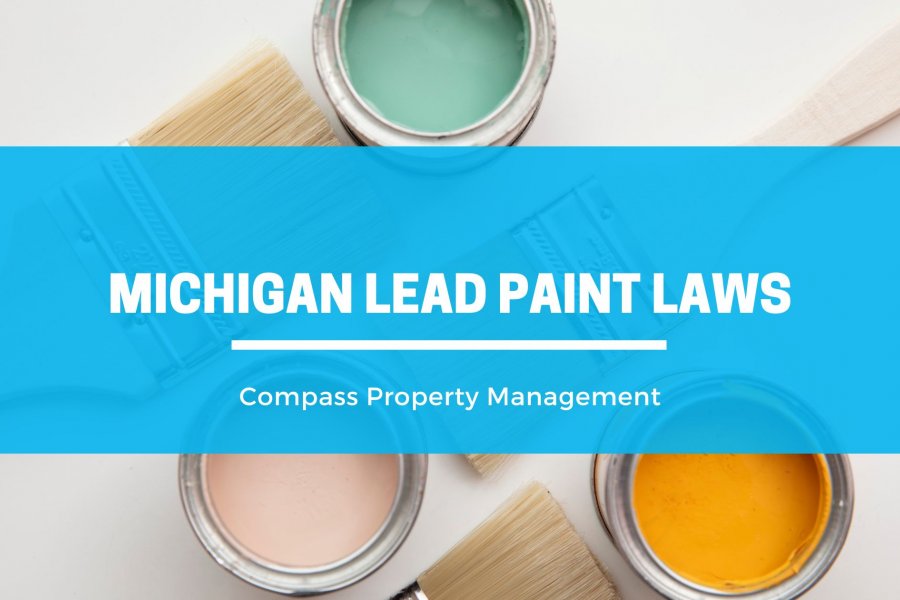
Is your rental property built before 1978? If it was, you should be extra vigilant about lead paint regulations. Hey there, Michigan landlords! Knowing the laws about lead-based paint is crucial for maintaining a safe environment for your residents and for steering clear of any legal troubles.
In Michigan, there are specific rules and guidelines that you need to follow if your property falls under the high-risk category for lead exposure. Not only can lead paint be harmful to residents, particularly children, but failure to comply with the laws can also result in heavy fines and even lawsuits.
So, whether you're renting out an old family home or just bought a new investment property in Grand Rapids, this article will provide you with a straightforward guide on Michigan's lead paint laws, how to stay compliant, and how to prevent lead hazards in your property.
Introduction to Lead Paint Law
Lead paint law refers to the set of regulations designed to facilitate lead poisoning prevention, particularly in homes built before 1978 when the U.S. banned the use of lead-based paints in residential properties.
These laws aim to protect residents from the harmful effects of lead exposure, such as developmental delays in children and various health issues in adults.

In Michigan, these laws are very much applicable and are strictly enforced. If you own or manage a property built before 1978, you are required to disclose any known lead-based paint or lead-based paint hazards to prospective residents.
You also have to provide them with an EPA-approved information pamphlet and include specific warning language in your rental contracts. Ignoring these lead-based paint hazard guidelines can result in hefty fines and legal complications.
It's crucial to understand and comply with these laws, as it is to understand all of the state’s landlord-tenant laws, to ensure the well-being of your residents and safeguard your investment.
Michigan’s Public Act 434
Michigan's Public Act 434 says that if rental property owners knowingly let families with kids who have high lead levels in their blood stay in homes with lead hazards, they could face fines or even jail.
This law also allows local health departments to check rental homes for health risks like lead-based paint, especially if a child living there gets sick from being lead poisoned. If you get a warning about lead problems in your property, act quickly to fix them. If you ignore these warnings, you could face serious consequences.
This law doesn't cover checks done by private companies you might hire to look for lead based-paint hazards. Your best move is to keep your properties safe from lead and respond quickly to any warnings or repair orders.

Checking Your Home for Lead-Based Paint
If your home was built before 1978 and you want to rent it out, there are important steps to take to ensure it's safe from lead-based paint exposure.
The Environmental Protection Agency (EPA) recommends that landlords have their property inspected by professionals who specialize in identifying and addressing lead risks. Here's how you can have your residential property tested:
1. Lead-Based Paint Inspection
Lead inspections determine whether your home has lead-based paint and pinpoints its locations. A certified inspector will examine the paint using these methods:
- Using a portable X-ray fluorescence (XRF) machine.
- Sending paint samples to a lab for testing.
2. Risk Assessment
A risk assessment identifies potential lead hazards from paint, dust, or soil in your home. It provides guidance on how to handle these hazards. A certified risk assessor will:
- Collect samples of deteriorated paint chips from various surfaces like windows, doors, walls, floors, and stairs.
- Gather dust samples near painted surfaces.
- Test bare soil in your yard.
- Send samples of paint, dust, and soil to a lab for analysis.
Alternatively, you can opt for a comprehensive inspection and risk assessment to find out if there are is a lead-based paint hazard present in your home.

This will help ensure the safety of occupants, especially children who are more vulnerable to lead exposure's harmful effects.
What You Need to Do
If you're a landlord in Michigan with a lead-painted property, it's crucial to follow specific steps to comply with federal lead abatement laws. Here's what you need to do:
- Hand out an informational pamphlet: Give your residents a copy of the EPA's pamphlet, "Protect Your Family from Lead in Your Home," when they're signing the lease.
- Tell residents about known lead paint: If you know there's lead-based paint hazards in the property, you need to tell the residents where it is.
- Share any lead paint reports: If you have any reports or records that show lead-based paint or hazards in the property, you have to share these with your residents.
- Attach a disclosure statement to the lease: This statement should be part of the lease. It should warn the residents about the dangers of lead paint and list any known lead-based paint hazards on the property. Both you and the resident need to sign and date it.
- Keep records for three years: After the lease is signed, keep copies of all related lead paint documents for at least three years.
By following these steps, you're not just obeying the law, you're also helping to keep your residents safe.

Conclusion
Understanding the lead paint laws in Michigan is crucial for ensuring the safety of your property and its occupants. By staying informed about regulations surrounding lead disclosure, renovation practices, and abatement procedures, you're taking a significant step towards a healthier living environment.
Managing all these aspects can be a handful, which is where professionals like Compass Property Management come in. With their expertise in property management, including compliance with lead paint laws, you can enjoy peace of mind knowing that your property is in capable hands.
Don't hesitate to explore the services offered by Compass Property Management to ensure your property meets the highest standards of safety and care.
Disclaimer: Please note that the information provided in this blog is intended for general guidance and should not be considered as a replacement for professional legal advice. It is important to be aware that laws pertaining to property management may change, rendering this information outdated by the time you read it.
